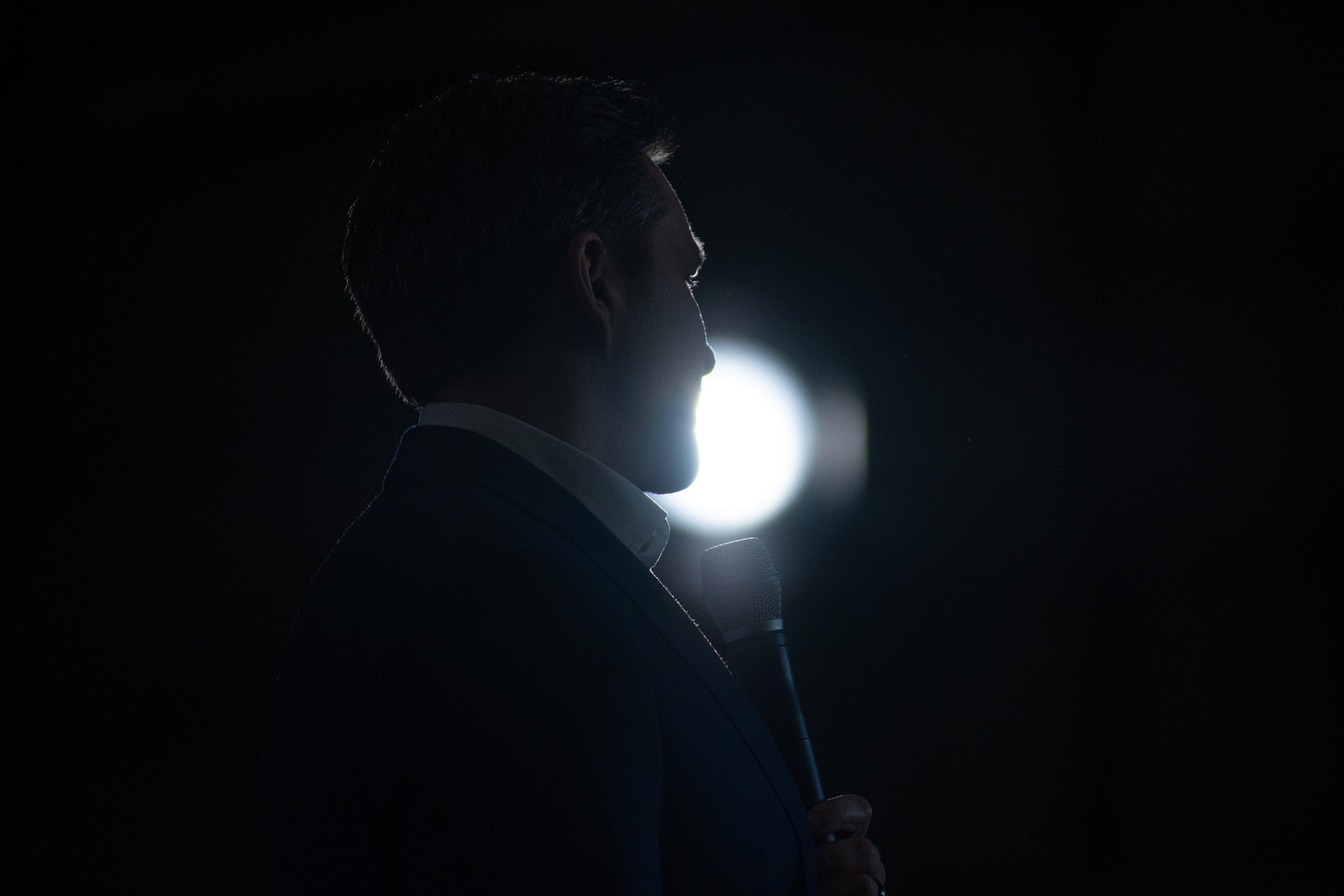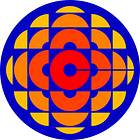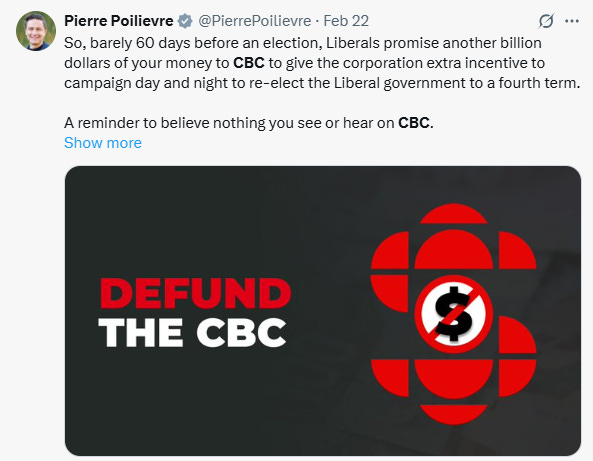The Medium is the Message (Stupid).
If the Trump-style media tactics weren't your biggest red flag in Election 45, you've been watching the wrong campaign.
Every Canadian schoolkid hears Marshall McLuhan’s famous phrase sooner or later, it’s practically etched into our cultural memory (complete with its own Heritage Minute on TV). In the 2025 federal election, that old slogan proved more than a dusty theory. It became a warning. If you haven’t noticed Pierre Poilievre’s Trump-style media strategy by now, congratulations, you’re probably firmly inside it.
“The medium is the message.” - Marshall McLuhan
By this final Sunday before voting day, Poilievre has so thoroughly shaped the campaign’s media environment that many Canadians are swimming in his narrative like fish oblivious to water. He’s effectively the chief editor of his own campaign coverage, beaming out a carefully crafted image of himself while casting traditional news outlets as villains. And if voters still don’t recognize the game he’s playing, it might be because the medium has become his message – and millions are hearing only him.
Canadian Media as a Defence Against American Influence
Canadian media wasn’t born yesterday. In fact, one of the reasons we even have a national press (especially the CBC) was to guard Canada’s cultural space against the overwhelming influence of the United States. From its inception in 1936, the CBC was intended as a shield – a publicly-funded source of Canadian stories and facts so that we wouldn’t be inundated by American news and rhetoric.[1] The logic was simple: without our own “tool kit” of media institutions, “Canada will be overwhelmed by American news and culture.”[2] Or in the famous aphorism of Graham Spry (one of the CBC’s founders): “It’s the state or the United States.”[3]
For decades, that strategy largely held. Generations of Canadians could turn on the CBC each night and hear our own accent, our own perspective – a subtle reinforcement that we are not merely the 51st state. Our public broadcaster and press at large became part of the national glue, promoting what policy wonks like to call “cultural sovereignty.” It wasn’t perfect (far from it), but it was a conscious defence against getting drowned out by the louder voice next door.
Fast-forward to 2025: that long-standing defence is under direct attack from within. Pierre Poilievre has made dismantling the CBC one of his marquee promises. He isn’t talking about reforming the Mother Corp or fixing its flaws – he’s talking about gutting it altogether. Poilievre has openly promised to defund the CBC, effectively pulling the plug on a key instrument of Canada’s cultural sovereignty.[4] He’s not shy about it either; at rallies, he leads chants of “Defund the CBC,” treating Canada’s 89-year-old national broadcaster as a partisan punching bag.[5]
Playing the Trump Playbook in Ottawa
Poilievre’s approach to the media could have been cribbed straight from Donald Trump’s 2016 campaign notes. Like Trump, Poilievre loves to demonize the mainstream press. He routinely labels any critical coverage as biased “fake news,” and he encourages his followers to disregard it entirely.[6] When Twitter (now X) briefly tagged CBC as “government-funded media” in 2023, Poilievre cheered.[7] The point of such attacks is clear: if Canadians haven’t lost faith in the independent press yet, Poilievre is working hard to make sure they do.
He hasn’t hesitated to attack individual reporters either – another hallmark of the Trumpian style. Rewind to his very first news conference as Conservative leader in 2022: when journalists dared to ask him questions he didn’t like, Poilievre lashed out.[8] Throughout this campaign, Poilievre’s team has severely limited media access, often allowing only a handful of pre-screened questions at his events.[9]
Meanwhile, Poilievre has been cultivating his own media empire to bypass traditional journalism. He is arguably the most prolific Canadian politician ever on YouTube and social media, pumping out slick videos, partisan podcasts, and Facebook posts to millions of followers.[10] He’ll do livestreamed town halls with hand-picked questions or release tightly edited videos. The strategy is to speak directly to Canadians through friendly platforms – unfiltered by pesky reporters or fact-checkers.[11]
The ‘Un-Canadian’ Choice for Prime Minister
All of this amounts to a campaign that, in tone and tactics, feels profoundly un-Canadian. Pierre Poilievre has deliberately imported a far more aggressive, polarized media strategy into our politics. He has Trumpified the Conservative playbook: delegitimize the press, peddle a narrative of a nation in ruins, and position himself as the sole truth-teller fighting a corrupt elite. It’s a strategy that might be right at home in the American Republican Party, but in Canada it sticks out like a maple leaf on Mar-a-Lago’s lawn.
Poilievre has leaned heavily on American rhetoric and allies, ironically borrowing the style and tactics of an American demagogue, all while tearing down a uniquely Canadian institution meant to protect us from that very thing.
SIDEBAR: “The Medium Is the Message” — Still Sending Signals
In 1977, Canadian media theorist Marshall McLuhan delivered a lecture elucidating his famous phrase, “The medium is the message.” He argued that the form of a medium embeds itself in the message it transmits, influencing how the message is perceived and understood. This concept suggests that the medium itself, not just the content it carries, should be the focus of study.Fast forward to today, and McLuhan's insights remain strikingly relevant. The rise of social media platforms has transformed political communication, where the medium—be it a tweet, a live stream, or a viral video—often overshadows the actual content. Politicians craft messages tailored to these platforms, understanding that the medium's characteristics can amplify or distort the intended message.
McLuhan's perspective encourages us to critically assess not just what is being said, but how it's being delivered. In an era where the medium can shape public perception as much as the message itself, his theory serves as a vital tool for media literacy and critical thinking.
On the eve of this crucial election, the choice before us isn’t just Liberal red vs. Conservative blue. It’s Canadian traditions vs. American-style tribalism. Poilievre has made himself the candidate of anger, suspicion, and spectacle – effectively inviting Canada to join the post-truth carnival that has consumed our southern neighbours. That makes him the un-Canadian choice for Prime Minister, by his own actions and attitude.
As we reflect on McLuhan’s old adage, remember: the medium is the message. Pierre Poilievre’s medium – his whole media strategy of distortion and division – is his message. And if that message doesn’t sit right with our idea of Canada, we already have our answer when we head to the polls.
Sources
[1] Canadian Broadcasting Corporation. (n.d.). Time capsule: 14 moments that marked our 85-year history. Retrieved from https://cbc.radio-canada.ca/en/your-public-broadcaster/blog/85-years-of-cbc-radio-canada-history
[2] Canadian Communications Foundation. (n.d.). The History of Canadian Broadcast Regulation. Retrieved from https://broadcasting-history.ca/the-history-of-canadian-broadcasting/industry-government/history-of-canadian-broadcast-regulation/the-history-of-canadian-broadcast-regulation/
[3] Library and Archives Canada. (n.d.). Spry, Graham - Address - Collection search. Retrieved from https://recherche-collection-search.bac-lac.gc.ca/eng/home/record?app=filvidandsou&idnumber=74291&wbdisable=false
[4] Conservative Party of Canada. (2025, April 22). Canada First. For a Change. Retrieved from https://www.conservative.ca/change
[5] CBC News. (2025). Observations from Poilievre Campaign Rallies. Retrieved from https://cbc.ca/news/canada/poilievre-rally-coverage-2025
[6] Poilievre, P. [@PierrePoilievre]. (2025). Official Campaign Social Media. Retrieved from https://x.com/PierrePoilievre/status/1893355580015927799
[7] NPR. (2023, April 18). CBC 'pausing' Twitter after 'government-funded media' label. Retrieved from https://www.npr.org/2023/04/18/1170574311/canadas-public-broadcaster-pauses-twitter-after-government-funded-media-label
[8] National Observer. (2022, September 15). Who calls a press conference then tells reporters no questions? Poilievre. Retrieved from https://www.nationalobserver.com/2022/09/15/opinion/who-calls-press-conference-then-tells-reporters-no-questions-poilievre
[9] Global News. (2025, March 20). Poilievre won't allow media to travel with him on election campaign. Retrieved from https://globalnews.ca/news/11088197/poilievre-conservatives-election-campaign-media/
[10] Northern Variables. (2025). Views, Rage, Repeat. Retrieved from https://axorc.substack.com/p/views-rage-repeat-how-the-conservative
[11] Policy Options. (2025, April 17). The high stakes of defunding the CBC. Retrieved from https://policyoptions.irpp.org/magazines/april-2025/cbc-fate-federal-election/







Notwithstanding my previous comment and despite being a long-time CBC fan, I was unhappy with their coverage of this election. I noticed a definite bias in favour of Pierre Poilievre and against Mark Carney.
Here is one of several emails I sent to the CBC ombudsman last week:
Dear CBC News,
I’m a huge fan of the CBC – been watching, listening (and more recently reading) you guys for decades. For the most part, I’m delighted with what you produce and that’s why I remain a loyal viewer, listener and reader.
However, I’ve been disappointed with the level of bias in your coverage of the upcoming federal election, particularly in some of the articles that have arrived in my inbox in the last several weeks and especially those written by Ian Froese, Manitoba provincial affairs reporter. Froese consistently gives more voice and space to Pierre Poilievre and the Conservatives than he does Mark Carney and the Liberals.
For example:
April 6: Conservatives target supervised consumption sites, NDP promises rent control
https://www.cbc.ca/news/politics/election-2025-day-15-campaign-promises-1.7503265 (Cons: 696 words including: “As it stands, Poilievre said consumption sites have been a "total disaster" in British Columbia, and the Liberals have refused to change course. "British Columbia has been the ground zero for this massive deadly Liberal failure," he said.” Meanwhile, the NDP get 505 words and the Libs: 61)
April 12: Carney attacked for wanting 'free ride,' 'hiding' from public amid latest campaign break https://www.cbc.ca/news/politics/mark-carney-free-ride-hiding-campaign-pauses-1.7508937 (All about Carney’s evil ways.)
April 14: As Poilievre targets tax havens, Conservatives rack up big business endorsements https://www.cbc.ca/news/politics/pierre-poilievre-criticism-tax-havens-loopholes-1.7509260 (880 words worth Poilievre’s stand on tax havens and endorsements.)
April 22: New Conservative ads aimed at older men show golfers, Harper but no Poilievre https://www.cbc.ca/news/politics/last-week-ad-campaigns-conservative-ads-no-pierre-poilievre-1.7514897 (662 words and an 8.5-minute video clip to the Conservatives compared with 114 and 74 words respectively to the NDP and Liberals respectively.)
Meanwhile, where is the coverage of Fuck-Carney-flag-waving, megaphone-wielding Conservative supporters harassing people waiting in line at Mark Carney’s event in Peterborough?
Here are some examples of investigative articles that show what is really going on in this election and the reporting thereof:
https://thetyee.ca/Analysis/2025/03/31/Extremist-Candidates-Welcomed-Poilievre-Team/
https://mailchi.mp/nationalobserver/on-the-road-with-poilievre-6685968?e=c456d973da
I hope changes can be made to eliminate the Conservative bias in CBC stories in these last few days of the campaign.
Thank you,
I enjoyed reading this article. As a dual-citizen, born in U.S. and moved to Canada 25 years ago, I never really understood the history of the CBC and why it was so important to Canadians. You explained that perfectly. I am worried about our election today. I do believe the Liberals will most likely receive the most votes, but it's the vitriol we have already observed from the far right Conservatives that will be intensified. And that both angers and scares me.